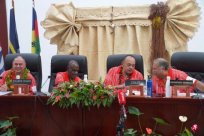Taiwan Lai Qingde's "Motherland theory" has caused heated discussions on the island for days.Secretary of State Daniel Kritenbrink on Tuesday (October 8) stated that to understand the matter and ask Taipei.
Kangda reiterated that the United States has not changed based on the Taiwan Relations Law, the United States and China three joint communiqués, and the six guaranteed "one China" policy.The fundamental interests of the United States.
Lai Qingde last Saturday (October 5) and throw "the theory of the motherland" at the double ten party, emphasizing that from an age, the People's Republic of China will never become the motherland of the people of the "Republic of China"; congratulations to congratulations;Happy birthday of the People's Republic of China, do not use the word "motherland".Kangda responded to this.
The Taiwan Affairs Office of the State Council of China accusations on Tuesday.
Huang Kuibo, a professor of diplomatic at the University of Political Science, analyzed the Lianhe Zaobao that from the perspective of Kangda's "asking Taipei" diplomatic language, there are two possibilities: one is that he doesn't know anything; the other is that he knows, but he doesn't want to answer.Since Lai Qingde's own trouble, Lai himself explained, and the latter is more likely.
Huang Kuibo said that Kangda finally emphasized that the most concerned about the United States is the peace and stability of the Taiwan Strait.Although it was shouting to both sides of the strait at the same time, this time it was mainly a small impression on Lai Qingde, that is, it was somewhat flexible under the policy of the United States under the United States, but do not let the United States encounter difficulties in the Taiwan Strait."Lai Qingde has always tried to interpret the relationship between Taiwan and the mainland, but the way of interpretation is not necessarily consistent with the direction of the hope of the United States."
The US Think Tank's "Chicago Global Affairs Committee" announced on Wednesday (October 9) that 51%of the respondents believed that the United States should encourage Taiwan to maintain the status quo, and 58%opposed to send troops in the Taiwan Strait to lead to direct war in the United States and China.
The double ten celebrations were held on Thursday (October 10) in Taiwan.Some analysts believe that Lai Qingde's "theory of the motherland" is in the to speak for the double ten celebration , and the outside world is highly concerned about whether Lai Qingde has anyFurther discussion.
The Central News Agency reported that Lai Qingde, who was also the chairman of the DPP, often talked about "the theory of the motherland" on Wednesday, because recently saw that Wu Kuangren and other Taiwanese artists posted on the National Day of the mainland, emphasizing that the "motherland theory" is along the DPPThe context of Taiwan's future resolution, the "four persistence" of the former Tsai Ing -wen, and the "four pillar action solutions" he proposed in the election did not exceed the aforementionDiscuss more space.
Zhu Lilun, the Kuomintang chairman of the wild, often pointed out in the party that Sun Yat -sen led the revolution to create the "Republic of China" 113 years ago. In Taiwan, each national is a "Republic of China" national.EssenceEach national of Taiwan is Taiwanese, and it is also the descendants of Yan and Huang, Han, Chinese, and Chinese.
The People's Party reiterated that the "Republic of China" and the People's Republic of China are two completely different political systems. There is no need to argue "who is the motherland."
In addition, the National Institute of Defense Security announced on Wednesday that the "Security Challenge and International Change Bureau: 2024 Taiwan National Defense and Foreign Policy Survey" polls ", and the results showed that nearly 70 % of the respondents were willing to fight in order to defend Taiwan.However, the public's confidence in the defense capabilities of the Taiwan Army is slightly insufficient. More than 70 % of the people believe that the United States will help Taiwan in indirectly, but the possibility of direct military intervention in the Taiwan Strait is retained.


